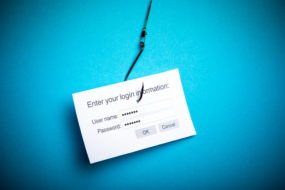 How can you tell when Spam goes bad?
How can you tell when Spam goes bad?
No, not the stuff in the can. Those canned emails that sometimes show up in your email.
Our server filtering does a fairly good job of preventing your inbox from being overloaded but, from time to time, a spam email will make it through.
This smell Phishy to you?
There are many flavors to email spam. The first step to stay safe is this one simple rule:
Avoid clicking links in email messages!
 This is primarily how you avoid becoming a victim of “phishing”. Typically carried out by email, Phishing is the fraudulent process of attempting to acquire sensitive information by masquerading as an entity the user trusts. Unless you are absolutely certain that the email was actually sent by the person or company claiming to have sent the message, it’s usually safer to go to the company’s website directly from your browser than by clicking on a link in an email message. Phishing attacks often directs users to enter details at a fake website that closely matches the real site.
This is primarily how you avoid becoming a victim of “phishing”. Typically carried out by email, Phishing is the fraudulent process of attempting to acquire sensitive information by masquerading as an entity the user trusts. Unless you are absolutely certain that the email was actually sent by the person or company claiming to have sent the message, it’s usually safer to go to the company’s website directly from your browser than by clicking on a link in an email message. Phishing attacks often directs users to enter details at a fake website that closely matches the real site.
Phishing attacks range from casting a wide net to smaller, targeted attacks. Spear phishing is a phishing attack that appears to be from a company, employer, or friend you are familiar with and usually includes a link or something to download. To make them look genuine, these messages may be personalized with publicly available information about you, the recipient. This type of approach is more difficult to detect than ordinary phishing. The links or downloads included in such a message can be malicious and might include viruses or fake websites that solicit personal information.
Never open email attachments from unknown persons.
 Use caution when opening attachments or following links – even from known sources! Scammers can make an email look like it came from someone legit, a tactic known as “Spoofing”. When in doubt, verify the authenticity of the message with the sender. Before you open an attachment, first save it to your computer, then scan the file with your antivirus software.
Use caution when opening attachments or following links – even from known sources! Scammers can make an email look like it came from someone legit, a tactic known as “Spoofing”. When in doubt, verify the authenticity of the message with the sender. Before you open an attachment, first save it to your computer, then scan the file with your antivirus software.
Another good trick for determining authenticity is putting in an incorrect password. A phishing site will likely accept an incorrect password because it wants to let you enter, while a legitimate site certainly won’t. You should also avoid calling phone numbers provided in the email or on the website, unless you can verify the number’s legitimacy.
Remember that Internet security begins at home.
- Never share your personal information
- Visit websites directly from browsers and bookmarks – not email links
- Double-check attachments before you click or download them
- Watch for misspellings and strange greetings (Hello Madam!)
- Be suspicious of emails that evoke a sense of urgency and ask for your immediate action
- When in doubt – DO NOTHING!
Antivirus software is essential but it does not make computers invulnerable. Antivirus programs are only an aid to safely navigating the digital landscape of the internet – not a full cure.
 If you receive a questionable email claiming to be from InsideOut, feel free to contact us via support@insideout.com. Send an email informing us of your concerns, then attempt to forward the offending message. I say “attempt” because Spam is often flagged by a spam filter when forwarded, confirming your suspicions.
If you receive a questionable email claiming to be from InsideOut, feel free to contact us via support@insideout.com. Send an email informing us of your concerns, then attempt to forward the offending message. I say “attempt” because Spam is often flagged by a spam filter when forwarded, confirming your suspicions.
Here To Help
As always, if you’re stuck or have concerns with your site or any of our services, please do not hesitate to contact us. The team here at InsideOut Solutions is ready to help!
